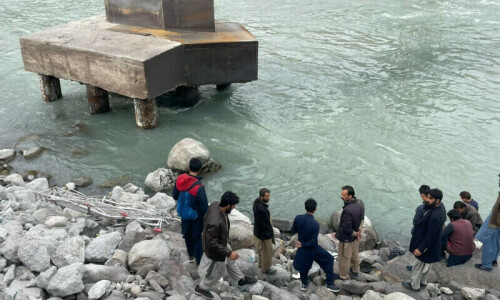KATHMANDU: A blockade of Nepal’s capital by ethnic activists entered its second week on Wednesday, with fresh violence reported and no sign of talks between fuel-starved Kathmandu and the demonstrators.
Leaders of southern Nepal’s Mahadhesi community, who are demanding federal powers, vowed to continue blocking the road between Kathmandu and the Indian border — the main corridor for most of the landlocked country’s imports.
“If we can show the people’s strength in the Terai, the state will meet our demands,” Anil Kumar Jha, a leading member of the United Democratic Mahadhesi Front (UDMF), said.
The Terai lowlands are home to about half of Nepal’s 27 million people, and the residents of the region, known as Mahadhesis, have long complained of being looked down upon by the Himalayan nation’s hill communities.
Demands for more political clout have mounted in the wake of a 2006 peace and power sharing deal between mainstream Kathmandu parties and Maoist rebels, which the Mahadhesis say has again excluded them from the corridors of power.
The south has experienced clashes and curfews, and a second protester was reported killed late Tuesday.
“At least 250 people have been injured and another 250 have been arrested in the protests so far,” Vishwanath Prasad Yadhav, a UDMF leader, said.
The Home Ministry did not have numbers for those injured or arrested.
In the capital, the general strike has forced schools to close and led to massive price hikes for food.
The official in charge of wood for cremations at Pashupatinath — Nepal’s holiest Hindu temple — said they were facing a critical shortage.
“In the 34 years that this wood depot has been open, we have never had a shortage like this,” Sambhu Prasad Chalise said. “Dead bodies will start to pile up if we don’t get wood soon.” After a major security operation, 15 tankers of fuel arrived in Kathmandu on Wednesday in addition to 12 tankers Tuesday, but oil officials say the capital needs at least 45 fuel trucks a day from India.
“The tankers that have arrived have brought only a fraction of what we need,” said Mukunda Ghimire, an official from the state-run Nepal Oil Corporation.
Protesters are using basic methods to cut the road, said a local official from Birgunj, a border town 80 km south of Kathmandu.
“They have been blocking roads with massive piles of stones as well as tree trunks. In some places they have even tipped over buses,” Bhola Prasad Shivakoti said.
The government has invited the UDMF to talks, but Jha said his group was first demanding “the state pay for those injured in the protests, release those they have arrested and stop using excessive force on protesters.” The tensions in the Terai come less than two months before Nepal is due to hold elections that will determine the country’s political future and most likely end the world’s last Hindu monarchy.
Wednesday is the deadline for political parties to submit candidates lists for the April 10 polls, and Mahadhesi leaders have told local media that they will boycott the elections unless their demands are met.
The United Nations, who are monitoring the peace process, has warned that unrest in the south could derail the twice-postponed polls.—AFP












































Dear visitor, the comments section is undergoing an overhaul and will return soon.